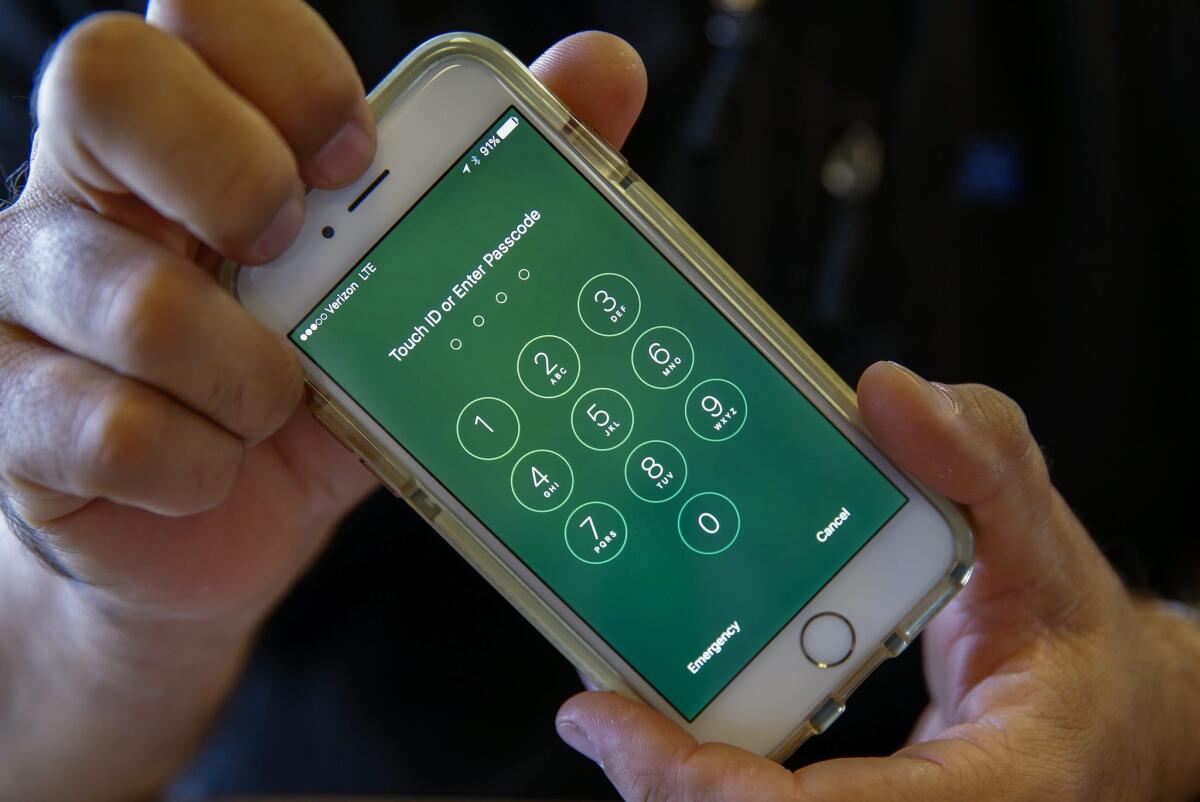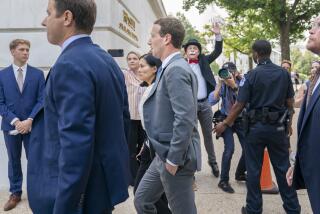Apple backs idea for panel to study technology and national security

The lock screen of an Apple iPhone 6.
- Share via
Reporting from WASHINGTON — Apple, which is battling a legal order to help the FBI open a terrorist’s encrypted iPhone, urged the government to back down Monday, calling instead for a panel of experts to study encryption and privacy concerns.
The proposed commission would issue a report only if it was created by Congress. It thus would have no direct effect on Apple’s standoff with the FBI, which now is in federal court in Riverside.
Join the conversation on Facebook >>
Rep. Michael McCaul (R-Texas), chairman of the House Homeland Security Committee, and Sen. Mark R. Warner (D-Va.), a member of the Senate Intelligence Committee, initially proposed the panel in December to study how to balance national security with privacy in the digital age.
Aides to the two lawmakers said Monday they were drafting legislation for Congress to establish the commission, and then to report back with recommendations on possible changes to the law, to government regulations and to business practices.
Sen. Richard M. Burr, chairman of the Senate Intelligence Committee, is drafting a competing bill that would penalize companies that don’t comply with court orders to decipher encrypted communications.
Apple executives endorsed the proposed commission in a Q&A that was published online Monday.
“We feel the best way forward would be for the government to withdraw its demands [in court] … and, as some in Congress have proposed, form a commission or other panel of experts on intelligence, technology, and civil liberties to discuss the implications for law enforcement, national security, privacy, and personal freedoms,” they wrote.
The issue was the latest wrinkle to the high-stakes battle for public opinion between Apple and the FBI since the technology giant announced last week it would oppose a federal magistrate’s order to write software to help the FBI hack into the iPhone that Syed Rizwan Farook used before he and his wife shot and killed 14 people in San Bernardino on Dec. 2.
“The courts should not be left to set policy without a national dialogue on how our national security and technology policy interact,” Warner said in a statement Monday.
“Absent a national consensus, we might end up with an ad hoc policy with serious long-term ramifications, including potentially undermining the competitiveness and technological innovation of the United States,” Warner said.
Technology executives argue that customers will stop buying Apple products and other U.S. digital devices if new laws require companies to weaken encryption or create a “backdoor” for investigators.
A commission “would bring together experts who understand the complexity and the stakes to develop viable recommendations on how to balance competing digital security priorities,” according to a description of the proposal on the website of the Bipartisan Policy Center, a think tank in Washington where McCaul and Warner are scheduled to appear Wednesday.
McCaul is a former federal prosecutor in Texas, and Warner has close ties with technology and telecommunications executives from his time running a venture capital fund.
In an op-ed published in the Washington Post on Dec. 27, McCaul and Warner urged Congress to “officially convene a body of experts representing all of the interests at stake so we can evaluate and improve America’s security posture as technology — and our adversaries — evolve.”
“Leaders here in Washington have failed to do this, and the relevant parties have not been brought together in an open, transparent manner,” they wrote.
MORE ON APPLE VS. FBI
Does Apple win even if it loses?
Pew survey: More Americans say Apple should unlock terrorist’s iPhone
Car makers had to install air bags; shouldn’t Apple have to hack its iPhone?
More to Read
Sign up for Essential California
The most important California stories and recommendations in your inbox every morning.
You may occasionally receive promotional content from the Los Angeles Times.












